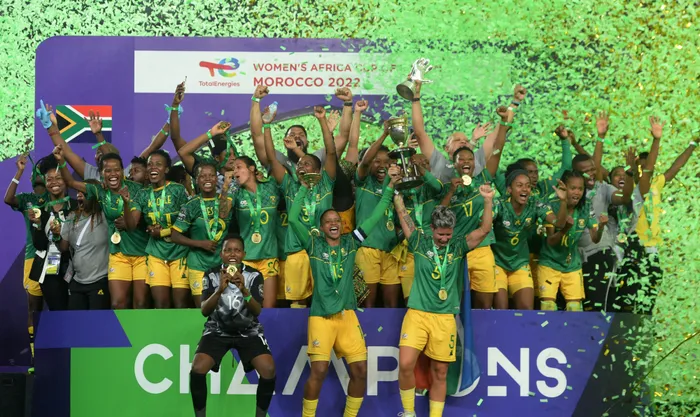Banyana Banyana, Amajita's conquests hinged on resilience, yet systemic reform is vital
Banyana Banyana and Amajita's recent successes highlight the resilience of South African football, but urgent reforms are needed to ensure sustainable growth and success in the sport

On top of the world Banyana Banyana players celebrate with the trophy after beating Morroco in the final of the last Women’s Africa Cup of Nations. Photo: BackpagePix
Image: BackpagePix
On the landscape of South African football, the tale of triumph and resilience continues to captivate and inspire following Banyana Banyana and Amajita's conquests in Africa despite significant challenges.
As a result of inadequate financial backing, high operational costs, player bonuses, staff salaries, infrastructure limitations and a lack of proper training facilities all combine to hinder a team's success.
These systemic issues strip away the potential for continuous success and leave players reliant on their inner fortitude.
South African teams exhibit admirable tenacity and spirit. However, their future success may depend more on comprehensive structural reforms rather than the sheer determination of the players.
In May 2025, South Africa's U-20 men's team clinched their maiden AFCON title through a narrow 1-0 win against Morocco in hostile Cairo. This hard-fought triumph was not only about talent but also about rising above problems along their journey.
The success of Banyana, particularly evident with their 2022 AFCON win, brings a glimmer of hope but also an urgent call to action. For South Africa to sustain its success in the international football arena, especially for future tournaments, the football fraternity must champion the need for reforms.
This includes ensuring equitable distribution of funding and increasing transparency in financial management across all levels of play.
Banyana are in Morocco, gearing up for a crucial title defence in the Women’s Africa Cup of Nations (WAFCON). Their championship campaign kicks off on Monday with a high-stakes match against Ghana.
However, days before their first game, the team found themselves compelled to stage a protest in a bid to draw attention to outstanding fees owed to them. Players voiced their frustration over unpaid bonuses and allowances, issues that have cast a shadow over their preparations.
While the resilience of players is commendable, it should not be the primary foundation upon which the team's success rests. The ongoing victories might resonate with national pride, yet they are often interpreted as a celebration of player grit rather than an affirmation of a well-oiled sporting structure.
The story of Banyana and their victory serves as a reminder that the status quo cannot be sustainable if South Africa is to emerge as a football powerhouse.
Implementing effective reforms will be essential not only for the national teams but for the entire football community, fostering an environment where talent can thrive without the incessant fear of operational shortcomings.
At the core of the systemic shortcomings in national football lies the persistent struggle to attract substantial sponsorship. This dilemma speaks volumes about the sport's governance and the challenges that underpin its daily operations. No wonder football comes under fire regularly.
The dream of a powerhouse South African football narrative is not just aspirational; it is attainable with the right concerted efforts aimed at stabilising the sport’s financial and operational integrity.
For the future of football in South Africa, embracing change is no longer an option—it is a necessity.
Related Topics: